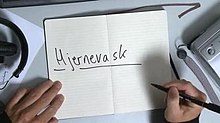Hjernevask ("Brainwash") is a Norwegian documentary miniseries about science that aired on NRK1 in 2010. The series, consisting of seven episodes, was created for NRK and presented by the comedian and sociologist Harald Eia.
| Hjernevask | |
|---|---|
 Title card | |
| Genre | Documentary miniseries |
| Created by | Harald Eia Ole-Martin Ihle |
| Country of origin | Norway |
| Original language | Norwegian |
| No. of seasons | 1 |
| No. of episodes | 7 |
| Production | |
| Running time | 40 minutes |
| Original release | |
| Network | NRK1 |
| Release | 1 March – 19 April 2010 |
The series contrasted cultural determinist models of human behavior (also referred to as the Standard social science model) with nature-nurture interactionist perspectives. In support of the cultural determinist perspective it interviewed mainly Norwegian humanities scholars, in particular literary theorist Jørgen Lorentzen at the Centre for Gender Research. Experts interviewed for the series in support of a nature-nurture interactionist perspective included Simon Baron-Cohen, Steven Pinker, Simon LeVay, David Buss, Glenn Wilson, Robert Plomin and Anne Campbell. This ignited a wide public discussion on the subject of the nature versus nurture debate, and especially focused on the views expressed by Lorentzen.[1][2][3][4] The entire series has since been released online.
Objectives and awards
editEia and coproducer Ole Martin Ihle have named Steven Pinker's book The Blank Slate as an inspiration for the documentary series.[5] The series was a huge success, and Eia was awarded the Fritt Ord Award for "having precipitated one of the most heated debates on research in recent times".[6]
Episodes
editThe producers have made the series available online.[7] Episodes linked in the external links have English subtitles available.
Reception
editHjernevask led to extensive public debate, largely focused on the views expressed in the program by literary scholar Jørgen Lorentzen at the Centre for Gender Research. Lorentzen's description of the research of psychologists Simon Baron-Cohen, Anne Campbell and Richard Lippa as "weak science" was strongly criticized by many commentators; biologist Trond Amundsen pointed out that Lorentzen's work was cited less than 30 times in academic literature and responded that "the characteristic 'weak science' would be rude and uncollegial if Lorentzen was a leading international expert and the three researchers were in fact not so meritorious. But all three are meritorious international researchers [...] against this background, the statement is just embarrassing."[9]
Lorentzen accused his critics including "Ottar Brox, Øyvind Østerud, Stig Frøland, Kristian Gundersen, Tor K. Larsen and others" of being "cowardly hyenas" who have shown "neither insight into nor interest in gender research."[10] Lorentzen also accused series creator Eia of being motivated by a midlife crisis.[11] Eia pointed out that Lorentzen has a very limited scholarly impact with few international publications and a very low number of citations, and said that he wouldn't have interviewed Lorentzen for the series if he had known at the time that Lorentzen was "such a low-level researcher."[12] Jon Hustad accused Lorentzen of being "blinded by ideology."[13] In response to claims by Lorentzen that NRK had portrayed him unfairly and misrepresented his comments, NRK made all the raw footage available.[14][15] Lorentzen complained to the Norwegian Press Complaints Commission (PFU). In June 2010 PFU concluded that NRK had not violated press ethics or portrayed Lorentzen in an unfair manner;[16] the chairman of PFU described Hjernevask as a "solid work" of investigative journalism.[17] Eia received the 2010 Fritt Ord Honorary Award for the series.[18][19]
Several years after Hjernevask aired, it was reported that it has been used in Eastern Europe to promote false claims that all gender studies research in Norway has been closed down in its aftermath; Harald Eia commented that he did not make Hjernevask for a Hungarian audience, and that he wanted to showcase the arrogance he felt Lorentzen displayed towards other research fields for a Norwegian audience.[20]
References
edit- ^ Braanen, Bjørgulv (17 March 2010). "Hjernevask". Klassekampen (in Norwegian).
- ^ Mikkelsen, Solveig (25 November 2011). "- Rammer kritisk og teoretisk tenkning". Universitetsavisa (in Norwegian). Norwegian University of Science and Technology. Archived from the original on 5 July 2017. Retrieved 2 January 2016.
- ^ "NRK legger ut Eia-intervjuet". Side2 (in Norwegian). Nettavisen. 1 April 2010.
- ^ "Slik brukes Hjernevask til å sverte norsk kjønnsforskning". forskning.no (in Norwegian). 29 April 2019.
- ^ "Vasker forskerhjerner". Universitas. 2010-02-24. Retrieved 2013-05-25.
- ^ "Harald Eia, Dag Hessen and Bjørn Vassnes receive the Fritt Ord Foundation Tribute". The Fritt Ord Foundation. December 8, 2010. Archived from the original on October 23, 2013. Retrieved September 5, 2012.
- ^ "Norwegian wood and the nature-nurture question". Mail archive. 2011-02-25. Retrieved 2013-05-25.
- ^ "Hjernevask på nrk.no" (in Norwegian). NRK. Retrieved April 6, 2010.
- ^ Trond Amundsen: Vitenskap med skylapper, forskning.no, 14 March 2010
- ^ Lorentzen, Jørgen (2010-04-20). "Hjerneshowet er over". Aftenposten.
- ^ "– Harald Eia er i 40-årskrise". Dagbladet. Retrieved 10 October 2021.
- ^ "Harald Eia møter kilden". SKUP 2010. Retrieved 10 October 2021.
- ^ Hustad, Jon (7 March 2010). "Ideologifabrikken". Aftenposten.
- ^ Karlsen, Ragnhild Krogvig (March 23, 2010). "Hjernevask vil legge ut råmateriale". NRK.
- ^ Kristiansen, Arnhild Aass (April 1, 2010). "Har lagt ut hele "Hjernevask"-intervjuet". dagbladet.no.
- ^ Kristensen, Geir Ramnefjell, Eivind (22 June 2010). «Lorentzen tapte mot Eia i PFU». Dagbladet
- ^ "Eias "Hjernevask" frikjent i PFU". VG. 22 June 2010.
- ^ Eia får ytringsfrihetspris, NRK
- ^ Fritt Ords Honnør 2010
- ^ Slik brukes Hjernevask til å sverte norsk kjønnsforskning, forskning.no